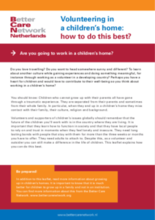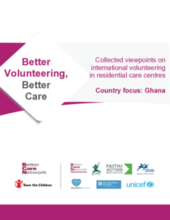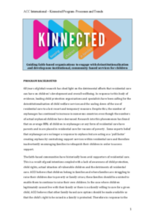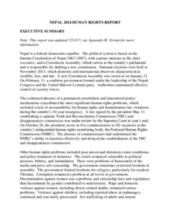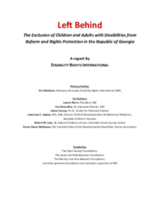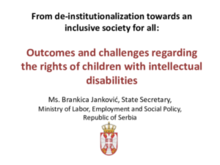Displaying 551 - 560 of 771
Escape the Box is an initiative designed to help raise awareness and try to put a stop to the rapidly growing, money making businesses that many orphanages have become.
This qualitative study explored the experiences of adults who had lived in group home care as adolescents and transitioned back into the community at the end of their treatment.
This leaflet was developed by the Working Group ‘Quality of Care’ of Better Care Network. It is published by Better Care Network Netherlands. The leaflet provides useful information on child development and children’s care for those planning to volunteer at orphanages in developing countries.
This overview is intended to contribute to discussions on international volunteering in residential care centres as an anecdotal research piece on the situation in Ghana.
The Kinnected program, developed by the Australian Christian Churches International (ACCI), is working toward the reduction of use of residential care of children and aims to assist children within the context of their families. This document provides an outline of the program and an overview of the lessons learnt.
This Human Rights Watch report gives a detailed overview of the situation faced by children with disabilities in orphanages in Russia.
This report, published by the US Embassy in Nepal, includes a segment on human rights issues related to orphanage voluntourism and donors, child abuse in child care homes, and a lack of Government regulation of institutions.
This video by Save the Children highlights the major reforms ongoing in Georgia to end harmful child institutionalisation and the work of its project to support the Government in this reform process.
This hard-hitting report by Disability Rights International is the product of a 3-year investigation into the orphanages, adult social care homes and other institutions that house children and adults with disabilities in the Republic of Georgia. It finds that although the Government of Georgia has undertaken an ambitious child care reform process over the last decade, institutionalized children with disabilities were largely excluded from this reform process.
This presentation to the 2012 Sofia Conference by Brankica Janković, State Secretary, Ministry of Labor, Employment, and Social Policy, introduces the achievements and challenges faced in altering the attitude of professionals working with children with disabilities from preferring institutions to family-based care systems.

